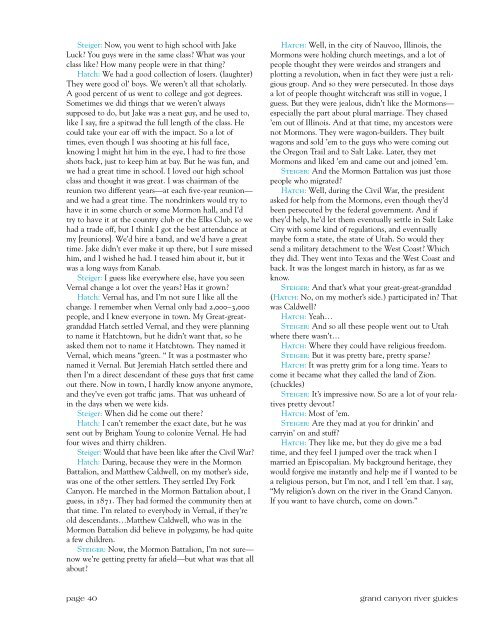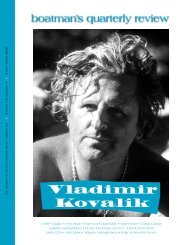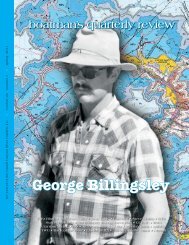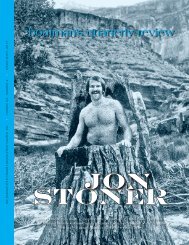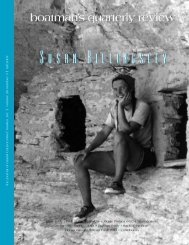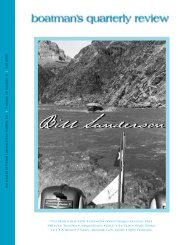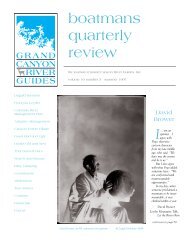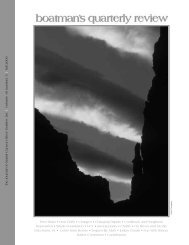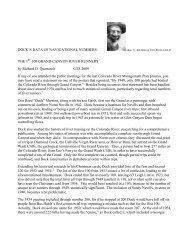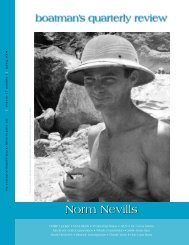summer 03 / 16:2 - Grand Canyon River Guides
summer 03 / 16:2 - Grand Canyon River Guides
summer 03 / 16:2 - Grand Canyon River Guides
- No tags were found...
Create successful ePaper yourself
Turn your PDF publications into a flip-book with our unique Google optimized e-Paper software.
Steiger: Now, you went to high school with JakeLuck? You guys were in the same class? What was yourclass like? How many people were in that thing?Hatch: We had a good collection of losers. (laughter)They were good ol’ boys. We weren’t all that scholarly.A good percent of us went to college and got degrees.Sometimes we did things that we weren’t alwayssupposed to do, but Jake was a neat guy, and he used to,like I say, fire a spitwad the full length of the class. Hecould take your ear off with the impact. So a lot oftimes, even though I was shooting at his full face,knowing I might hit him in the eye, I had to fire thoseshots back, just to keep him at bay. But he was fun, andwe had a great time in school. I loved our high schoolclass and thought it was great. I was chairman of thereunion two different years—at each five-year reunion—and we had a great time. The nondrinkers would try tohave it in some church or some Mormon hall, and I’dtry to have it at the country club or the Elks Club, so wehad a trade off, but I think I got the best attendance atmy [reunions]. We’d hire a band, and we’d have a greattime. Jake didn’t ever make it up there, but I sure missedhim, and I wished he had. I teased him about it, but itwas a long ways from Kanab.Steiger: I guess like everywhere else, have you seenVernal change a lot over the years? Has it grown?Hatch: Vernal has, and I’m not sure I like all thechange. I remember when Vernal only had 2,000–3,000people, and I knew everyone in town. My Great-greatgranddadHatch settled Vernal, and they were planningto name it Hatchtown, but he didn’t want that, so heasked them not to name it Hatchtown. They named itVernal, which means “green. “ It was a postmaster whonamed it Vernal. But Jeremiah Hatch settled there andthen I’m a direct descendant of these guys that first cameout there. Now in town, I hardly know anyone anymore,and they’ve even got traffic jams. That was unheard ofin the days when we were kids.Steiger: When did he come out there?Hatch: I can’t remember the exact date, but he wassent out by Brigham Young to colonize Vernal. He hadfour wives and thirty children.Steiger: Would that have been like after the Civil War?Hatch: During, because they were in the MormonBattalion, and Matthew Caldwell, on my mother’s side,was one of the other settlers. They settled Dry Fork<strong>Canyon</strong>. He marched in the Mormon Battalion about, Iguess, in 1871. They had formed the community then atthat time. I’m related to everybody in Vernal, if they’reold descendants…Matthew Caldwell, who was in theMormon Battalion did believe in polygamy, he had quitea few children.Steiger: Now, the Mormon Battalion, I’m not sure—now we’re getting pretty far afield—but what was that allabout?Hatch: Well, in the city of Nauvoo, Illinois, theMormons were holding church meetings, and a lot ofpeople thought they were weirdos and strangers andplotting a revolution, when in fact they were just a religiousgroup. And so they were persecuted. In those daysa lot of people thought witchcraft was still in vogue, Iguess. But they were jealous, didn’t like the Mormons—especially the part about plural marriage. They chased’em out of Illinois. And at that time, my ancestors werenot Mormons. They were wagon-builders. They builtwagons and sold ’em to the guys who were coming outthe Oregon Trail and to Salt Lake. Later, they metMormons and liked ’em and came out and joined ’em.Steiger: And the Mormon Battalion was just thosepeople who migrated?Hatch: Well, during the Civil War, the presidentasked for help from the Mormons, even though they’dbeen persecuted by the federal government. And ifthey’d help, he’d let them eventually settle in Salt LakeCity with some kind of regulations, and eventuallymaybe form a state, the state of Utah. So would theysend a military detachment to the West Coast? Whichthey did. They went into Texas and the West Coast andback. It was the longest march in history, as far as weknow.Steiger: And that’s what your great-great-granddad(Hatch: No, on my mother’s side.) participated in? Thatwas Caldwell?Hatch: Yeah…Steiger: And so all these people went out to Utahwhere there wasn’t…Hatch: Where they could have religious freedom.Steiger: But it was pretty bare, pretty sparse?Hatch: It was pretty grim for a long time. Years tocome it became what they called the land of Zion.(chuckles)Steiger: It’s impressive now. So are a lot of your relativespretty devout?Hatch: Most of ’em.Steiger: Are they mad at you for drinkin’ andcarryin’ on and stuff?Hatch: They like me, but they do give me a badtime, and they feel I jumped over the track when Imarried an Episcopalian. My background heritage, theywould forgive me instantly and help me if I wanted to bea religious person, but I’m not, and I tell ’em that. I say,“My religion’s down on the river in the <strong>Grand</strong> <strong>Canyon</strong>.If you want to have church, come on down.”page 40grand canyon river guides


